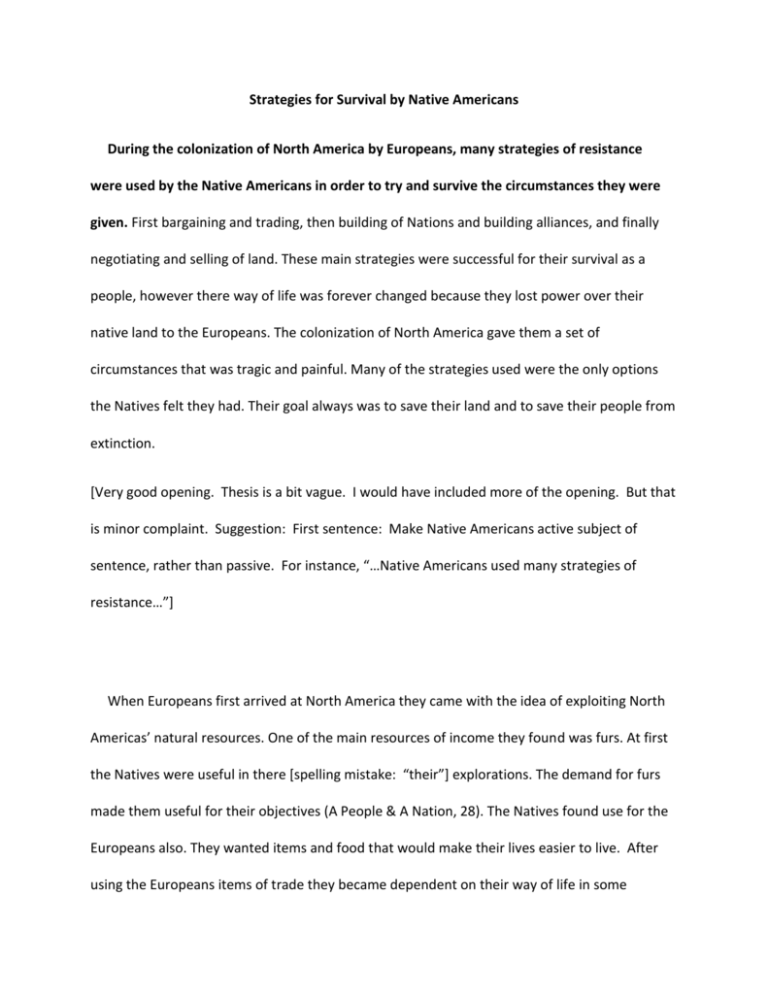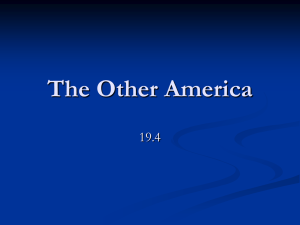YJohnson_Strategies for Survival by Native Americans
advertisement

Strategies for Survival by Native Americans During the colonization of North America by Europeans, many strategies of resistance were used by the Native Americans in order to try and survive the circumstances they were given. First bargaining and trading, then building of Nations and building alliances, and finally negotiating and selling of land. These main strategies were successful for their survival as a people, however there way of life was forever changed because they lost power over their native land to the Europeans. The colonization of North America gave them a set of circumstances that was tragic and painful. Many of the strategies used were the only options the Natives felt they had. Their goal always was to save their land and to save their people from extinction. [Very good opening. Thesis is a bit vague. I would have included more of the opening. But that is minor complaint. Suggestion: First sentence: Make Native Americans active subject of sentence, rather than passive. For instance, “…Native Americans used many strategies of resistance…”] When Europeans first arrived at North America they came with the idea of exploiting North Americas’ natural resources. One of the main resources of income they found was furs. At first the Natives were useful in there [spelling mistake: “their”] explorations. The demand for furs made them useful for their objectives (A People & A Nation, 28). The Natives found use for the Europeans also. They wanted items and food that would make their lives easier to live. After using the Europeans items of trade they became dependent on their way of life in some aspects. They lost skills that they had developed for their own survival. What started out as a lucrative business ended up being their first loss of power because of their growing dependence on the British (“Native Americans in the Wars”). That same lucrative trading system caused a new item of introduction liquor or alcohol was given to the natives. This item caused a lot of destruction to the native people (“The Indians’ New World: The Catawba Experience”, James H. Merrell, pg. 549). Because of alcohol the behaviors of the Natives changed because of their drunkenness in their society (“Native Americans in the Wars”). Men would fight amongst themselves and women children had to run in the woods for safety. This was probably the first sign of society breaking down within. [Good topic of trade and positive/negative aspects. But you could clean up repetitive sentences and add a little on what N.A. got out of trade. Was it just “business” or was it more? I would like to read your analysis of how Native Americans used trade to their benefit.] [Similar problem of passive sentence structures below. Make the Native Americans active. The tribes united for survival, instead of strategy as subject. Native population declined and affected traditions. Etc.] Another strategy used was the uniting of tribes for survival. After losing traditions because of death by diseases and death because of brutal attacks the natives were small in numbers at times (“The Indians’ New World: The Catawba Experience”, James H. Merrell). One example of this building of confederacies was show in the video (“Native Americans In the Wars”). Pontiac was the leader a group of natives against the colonist. He did win some forts. Most of the tribes that formed nations or confederacies want to remain neutral most of the time. The first wars were not theirs to fight. Different objectives by the leaders of the Natives such as wanting to get rid of the colonist, wanting ammunition, and protecting previous bonds that were made caused difference of opinions at times. Another example was the Iroquois who helped the British fight against the colonist in 1777. This group was convinced to take this strategy by Joseph Brantt (A People & A Nation, 161). The uniting of tribes was a great idea. However all natives needed to be united in order to maintain control over the land to fight their own war that they were losing. Because of different beliefs within the natives they were divided at times. Their need for ammunition and dependency on the British caused them to make certain choices that did not end up helping them out the end. [Good topic above: unification. I would make stronger topic sentence at beginning of paragraph. Cut out repetition and be more clear about the obstacles to unification.] After everything else had failed eventually the Natives had to figure out one thing. They had no power at all after all the wars and treaties had been made they were forced to try to negotiate some selling of some land that they did attain in some land grants from previous bonds. Natives such as Major Ridge realized that they had to figure out something in order to save some of their people. Major Ridge decided without the approval of councils to sell land to the government in exchange for a smaller piece of land and hopefully some protection (“Native Americans In the Wars”). In 1849 the creation of reservation was established to protect Natives from white incursion (A People & A Nation, 351). Some natives accepted this idea and some rebelled. [Some very interesting information in paragraph above, but not framed in most articulate or powerful way? What is really going on in the developments above? Where did Major Ridge get power in that situation? Was it a tactic that other tribes could follow? Can you summarize the main message of above paragraph? What is the main point you would like the reader (me) to know? Could you summarize it in one or two really good sentences? You should do that for every paragraph.] There were many strategies of resistance attempted by the Natives against the Europeans in North America. Strategies such as, bargaining and trading, building of nations and alliances when in battles, and negotiating and selling of land, were not effective in their freedom or in their rights to the land. Europeans during their colonization of North America ended up using the Natives to serve them in fulfilling their objectives at all times. The Natives eventually lost the battle for control. However they did survive the extinction of their people a painful tragedy indeed. [Good conclusion overall. Last couple of sentences could have been fleshed out (explained) in a little more depth. I think you are right, but I want to know what Native Americans retained in your best articulation.] [General criticisms: Very good ideas. Good opening and closing, just need a little tweaking here and there. Choice of themes for paragraphs in body of paper was good too. Just need to make sure that you articulate as clearly as possible how each paragraph is going to help the reader understand your broader argument. Why does the reader want/need to read that paragraph? Why not just skip it? You have to make the reader really want to read the paragraph and, once it is read, fully understand how it fits into the larger structure of your argument. Sometimes details can be cut out if you meet these more important objectives.] [Grade: 92, A-] Works Cited "Native Americans in the Wars". Dir. Jack Luetig. Perf. Kevin Costner. 2008. Merrell, James H. "The Indians' New World: The Catawba Experience." October 1984. 2011 01 06 <http://www.jstor.org/stable/1919153>. Norton, Mary Beth, et al. A Peopl & A Nation. Boston: Houghton Mifflin Company, 2008.









